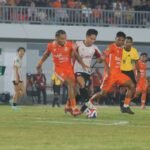Liga Malang: Kebangkitan Sepak Bola Indonesia is a testament to the passion for football that courses through Indonesia’s veins. This regional league, nestled in the vibrant city of Malang, East Java, is a microcosm of the nation’s football renaissance—one marked by growing talent, dedicated fans, and a burgeoning infrastructure. To understand the significance of Liga Malang in the broader context of Indonesian football, we must delve into its origins, development, and its impact on both the local community and national landscape.
Malang has a rich football heritage, with a fervent fan base and a history of producing top-tier players. The establishment of Liga Malang can be traced back to the post-1990s era when Indonesia was undergoing significant transitions in its sporting culture. The league emerged as a grassroots initiative, aiming to harness local enthusiasm and provide a structured platform for young talents. Over the years, it expanded, drawing teams from various districts and becoming a cornerstone of the local sporting calendar.
One of the critical elements of Liga Malang’s success is its focus on youth development. Football academies and clubs affiliated with the league prioritize training young athletes, providing them with not just technical skills but also instilling discipline and sportsmanship. These academies are often collaboration efforts with schools, ensuring a balance between education and athletics. As a result, many players from Liga Malang have progressed to national prominence, contributing to Indonesia’s improving performance on the international stage.
The league’s structure ensures that it is competitive yet inclusive. It adopts a multi-tiered system that allows teams of varying skill levels to compete and grow. Promotion and relegation are integral, maintaining competitive integrity and providing teams with goals to aspire to. This structure not only keeps the competition intense but also offers clubs the opportunity to develop their infrastructures, knowing that success can lead to greater recognition and resources.
Liga Malang’s rise aligns with technological advancements and digital engagement. The league has seized social media platforms to reach a wider audience, providing fans with live updates, highlights, and behind-the-scenes content. This digital presence has been pivotal in engaging younger demographics, transforming passive followers into active participants in the football culture. Online fan forums and communities thrive, where supporters gather to discuss tactics, celebrate victories, or commiserate losses, strengthening the communal bond.
Financial stability is another pillar supporting Liga Malang’s ascension. The league has been adept at securing sponsorships from local businesses eager to align themselves with its growing popularity. These partnerships not only provide financial support but also bolster the league’s community roots, as businesses engage in cross-promotional activities that benefit both sports and commerce sectors. In recent years, the added revenue has enabled Liga Malang to enhance training facilities, improve matchday experiences, and professionalize club operations.
Cultural factors also play a significant role in the league’s identity. Football in Indonesia is more than a sport; it’s a cultural phenomenon. Matches are family affairs where friends and relatives gather, creating a vibrant, festive atmosphere reminiscent of larger national celebrations. Chants, music, and food stalls are staple features at Liga Malang games, transforming them into events that transcend the boundaries of a football pitch, fostering a sense of belonging and pride among residents.
The impact of Liga Malang is visible in the city’s economic dynamism. Game days boost local businesses as restaurants, hotels, and transportation services see increased patronage. Moreover, through workshops, community events, and player outreach programs, Liga Malang contributes to social development by addressing critical issues like education, health, and youth empowerment. This integration of football and community welfare underscores the league’s ethos of not just developing players but also enhancing lives.
Another aspect worth noting is Liga Malang’s role in promoting gender equality in sports. As women’s football gains traction globally, Liga Malang is also paving the way by encouraging female participation. Initiatives to support women’s teams and leagues have seen rising interest, and female athletes now have pathways to pursue football professionally. This effort reflects a broader societal shift towards inclusivity, helping dismantle traditional barriers in sport.
Environmentally, the league has also taken commendable steps. Recognizing the importance of sustainability, clubs under the Liga Malang banner have adopted green practices like waste reduction at stadiums and promoting public transport for fans. These initiatives are not only environmentally friendly but also educate the public on the importance of sustainable practices.
Liga Malang serves as an inspiring model for other regions aiming to develop their local sports scenes. Its emphasis on community, sustainability, and equitable growth results in a resilient ecosystem that thrives amid challenges. As Indonesia continues to progress in the footballing world, leagues like Malang play an instrumental role in the narrative, embodying the spirit and ambition of a nation eager to cement its place on the global football stage. The league’s journey mirrors that of Indonesian football as a whole—one of determination, resilience, and an unwavering love for the beautiful game.







